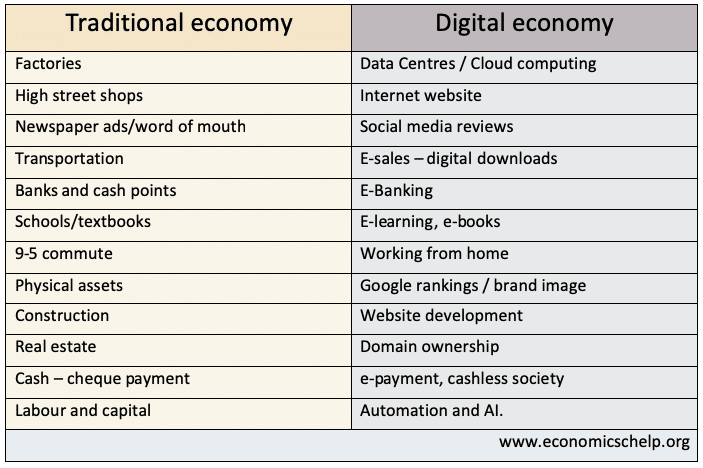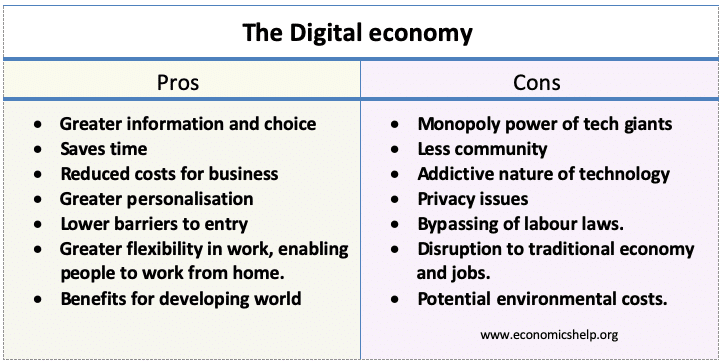What is the digital economy?
The digital economy refers to economic activity that uses electronic communication and digital technologies to provide goods and services. The main building blocks of the digital economy are
- The internet. This enables firms to offer goods for sale and enables consumers to browse for goods that they need.
- E-mail. Electronic communication enables very cheap, instantaneous communication across the world. It can be used to send information and requests very quickly.
- Digital automation. Firms can use the processing power of computers to make decisions on output, prices and how to reach consumers.
- Digital payments – credit cards, Apple Pay, Google pay, bitcoin, bank transfer. A digital economy is moving us towards a cashless society.
- Automation. Increasingly the digital economy relies on AI, mass use of electronic data and automated technology
- Social media. To a lesser extent, social media is an aspect of the digital economy. With individuals using it share recommendations about business.
The traditional economy is based on physical shops, goods and cash payments. Over time, the traditional economy has adopted aspects of the digital economy, e.g. traditional firms taking debit cards, then selling online. As the digital economy evolved, some firms missed out on having a physical shop altogether, and selling straight from an e-commerce site, delivered to consumers homes. Some digital services now have no physical goods. For example, Netflix and Spotify do not need to use any physical goods but has everything streamed through the internet.
Examples of the digital economy
- Airbnb – This enables tourists to book online. It has also made it possible for individual households to let our their house/room to tourists. Before the digital economy it was not practical.
- Amazon market place/Ebay.
- Netflix – This enables consumers to purchase tv-series and films over the internet, without need for any physical good.
- E-commerce site – E.g. Economics help, selling e-books for economics revision.
Advantages of the digital economy
- Greater information. The internet has enabled consumers to have greater information and choice. For example, it makes it easier to compare prices between firms. It also brings information to a person’s fingertips. This is particularly important for tourists going on holiday. Before the digital economy, it might not be possible to find the prices of hotels and bus timetables.
- Saves time. Before if you needed office supplies, you would have to make a journey into town and purchase. Now, you can make an order over the internet and it will arrive the next day. This saves business labour costs.
- Reduced costs. Firms can save on renting expensive buildings by running most of business through the internet. A digital economy enables firms to cut out an aspect of the retail chain and send personalised goods direct from factory or warehouse to people’s goods, rather than through shops. This enables lower costs and lower prices.
- Personalisation. A digital economy allows greater personalisation than would be possible under traditional economy. For example, a traditional shop would only have room to stock a certain number of colours and sizes, but with the digital economy, a consumer can choose any preference and then the product can be custom-built e.g. 3D printer. For example, custom clothes that have particular sizes and colours to match individual preferences.
- Lower barriers to entry. In some markets, aspects of the digital economy make it easier for new firms to enter. If an entrepreneur has an innovative idea that catches on, they can create a new product which challenges traditional firms. The digital economy has brought many new services which were inconceivable before, such as online home deliveries for grocery to dating apps.
- Creates significant data which can give new insights. The mass production of data can help inform governments and charities about what is happening in the economy. For example, in tracking of COVID-19 spread, the use of an app on mobile phones may indicate where local hotspots emerge.
- Benefits for developing world. The digital economy is opening up opportunities for the developing world. For example, computer programmers in India can easily underbid western counterparts, leading to new job opportunities and higher income in India.
- Enables people to work from home. The digital economy has been a huge asset during the COVID lockdown. Without digital technologies, the decline in economic activity would have been even greater. The digital economy gives greater scope for people working from home and having greater flexibility in their hours (which may suit parents with children). Working from home can reduce contact and spread of a virus. It can also help reduce traffic congestion and pollution.
Problems of digital economy
- Monopoly power. Despite the potential for new start-ups, many aspects of the digital economy have become dominated by firms with monopoly power. For example, Amazon has cornered the market for online sales, meaning many firms have to go through the Amazon market place to reach consumers who go to Amazon out of habit. Similarly, Google and Facebook have all developed very strong brand loyalty and market share in their respective markets. This has made a few tech giants very profitable. WIth monopoly power, Google are able to charge high prices for online advertising and Amazon have the market power to undercut traditional booksellers.
- Less community. A traditional bookshop can act as a focal point for local community. It may hold events, book signings and individuals may enjoy the experience of browsing physical books. With the digital alternative undercutting traditional firms, old fashioned bookshops are forced out of business. Although books may be cheaper, we have lost physical interaction between sellers and buyers which was an important aspect of the buying experience.
- Addictive nature of technology. Whilst, in theory, the internet can save time, e.g. finding bus times is much easier with internet than paper copies, this time saved may be outweighed by the time we waste checking Facebook, twitter, internet searches. Also, the sheer volume of information can cause us to drown in information and lose sight of what we actually need. More choices do not necessarily lead to better outcomes. When faced with a bewildering range of outcomes, we can take time to decide and it becomes easier to procrastinate.
- Privacy issues. Harvesting and using data has become big business. Facebook collects a large range of data on its users and this has been bought by political interests who can give very targetted political ads to its users.
- Bypassing of labour laws. The digital economy has created a trend towards using self-employed freelancers, who are not protected by the same labour laws. For example, delivery drivers for Deliveroo and Uber drivers have often been employed on zero-hour contracts. This enables firms to cut labour costs, be more flexible, but it can leave workers without sick pay or employment protections.
- Social media has led to more graphic content. The anonymous and distant nature of social media has exacerbated trends to personal attacks and the posting of conspiracy theories or posting of violent/sexual images. The digital economy has enabled the proliferation of content that is damaging to human well-being.
- Disruption patterns. The economy has always faced disruption from new technology – from the period of the Luddites to the assembly line. However, the digital economy is increasing the pace of change, causing many traditional firms (high street retailers) to go out of business. The rise of AI may threaten jobs in a whole new range of service sector industries. In theory, new technology will lead to changing patterns of activity, but no increase in overall unemployment. However, the pace of digitalisation can lead to structural unemployment, with some unskilled workers increasingly losing out to skilled workers. Combined with the monopoly power of big tech firms, it is causing an increased inequality in society, which may lead to feelings of alienation and unfairness.
- Environmental costs. It is a mistake to think that the digital economy implies a ‘green solution.’ Data centres use electricity and cause CO2 emissions. In the US, data centres account for around two per cent of U.S. electricity use in 2014. (link) A bigger potential cost is how the digital economy encourages a ‘throw-away’ culture. E.g. the planned obsolescence of mobile phones and computers, encouraging consumers to buy new models, leading to greater use of raw materials.
Related



thank you for this information. I learned a lot from this.
Thank you for the valuable presentation format. Very helpful in simple language.